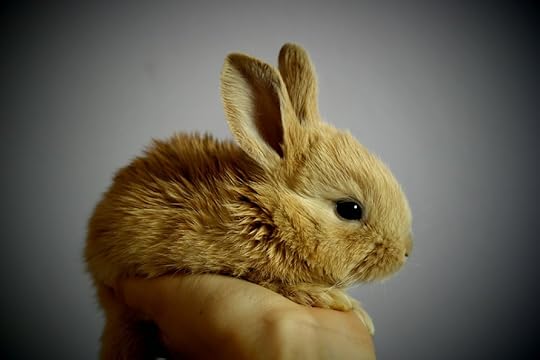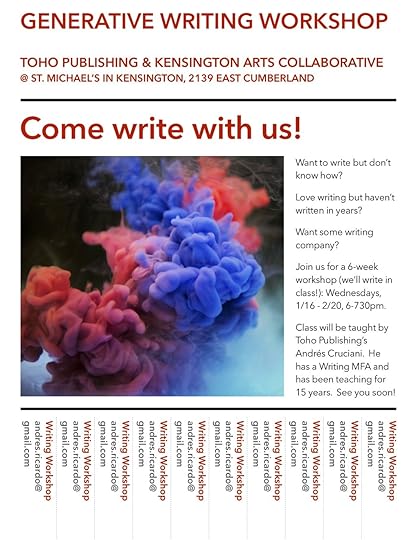Andrés Cruciani's Blog, page 2
January 28, 2019
Generative Writing Workshop Member Update

Well, folks, Andrés Cruciani of Toho Publishing here, and I’m back after a flu that knocked me out for a week. Today, a special blog post from one of our participants in our generative writing workshop. Without further ado, here’s Vivian:
Dear Andrés,
I wasn’t sure where your Creative Writing course would take me or where it would take the group last Wednesday, but I haven’t stopped thinking about it, so I wanted to thank you for an amazing first session.
The material we discussed and the way you managed to set us free to write beyond our comfort-zone was uncanny. You had selected hands-on exercises that challenged me and each member of the group to explore uncharted territory.
You masterfully dared us to write, to let our thoughts flow, without judgement, being fully present. Starting with a plain description of an unfamiliar room as a prompt was brilliant and where the prompt took each of us, captivating. I felt like you managed to make us feel wholly present, attentive, and observant of all our senses, and in doing so, we delved into deeper thoughts and feelings that seemed to freely flow into our journals. In just ninety minutes, each of us seemed to have become a true “creative writer” in the rough.
I was moved by each piece shared among the group. The moist eyes around the room made me realize I wasn’t alone. Your extemporaneous prose was exquisite, but the group’s raw feelings and instinctive writing seemed even more powerful, as was this piece (about the room we were in, a small study in a church) that one of the members shared with us:
Fascinating task. Write about what we do not pay attention to. A room with people that I don’t know but who I would like to know. People with different lives and stories. Why in this room? The word fascinating comes to mind once again.
My tinnitus dominates the silence broken only by my typing. The table I’m leaning on does not want to tell me its story yet. How many generations of people sat at this chair before me? I will probably never know. The smell does not tell me its secrets. But why? Am I resisting its talking? No, I want to understand …
A hundred and twenty-year-old compilation of smells, of thousands of believers, must have meaning even if I can’t break the code. Perhaps I’m not ready to read it, or I don’t know the language. Perhaps the room does not care that I don’t understand its story. Perhaps I was making this place about me and hurt its insides. Why would this room be willing to share the secrets of the sweat of those that rode on horseback to come to service and the sweat of those who walked miles? The scent of the flowers that must have been placed in vases to honor or to thank God, to thank a fellow parishioner perhaps or to negotiate God’s favor. How much of this scent is contributed by the tears of those who came looking for consolation? I don’t know, and nobody knows. Not true, the room knows but wants to make me work for it. Why would it share this precious history with me? What have I done to deserve it? To earn its trust?
If art is the expression of beauty or emotional power that touches our sensibilities, we as a group had created art!
You are a gifted teacher. I feel excited and intrigued about our next session …
Thanks for leading and inspiring us!
Vivian
Toho Publishing aims to be the best small publisher in Philadelphia, and we’ve published our first novel. Join us on all the things: Facebook, Twitter, Medium,YouTube, and Instagram.

January 18, 2019
Attack of the Plot Bunnies!
 Sure, it SEEMS cute, but imagine being smothered by one million of them.
Sure, it SEEMS cute, but imagine being smothered by one million of them.Well, folks, Andrés Cruciani of Toho Publishing here, and today’s post comes to us from Parker Hilley, an intern here at Toho. She writes about the nefarious plot bunny, which perhaps (like a few of us here), you’ve never heard of. Enjoy! (Here’s Parker.)
“Ideas are like rabbits. You get a couple and learn how to handle them, and pretty soon you have a dozen.”
— Commonly attributed to John Steinbeck
I used the term “plot bunny”once in a creative writing class in college and was surprised that I had to explain what exactly a plot bunny is. For those of you who didn’t have a prolific fanfiction phase in middle or high school (or later in life — hey, I’m not judging! I still read and write Harry Potter fanfiction well into my twenties!), plot bunnies refer to story ideas that hop around in your brain until you write them down. Sometimes a plot bunny is small and sweet, maybe just an idea for a short story that you can quickly jot down to return to later, if you have the time. But other times, a plot bunny seems more like a plot bear — roaring its story so loudly you can’t even think about working on anything else. And that means pushing aside other work (much like I did to write this post!) to take care of that monster plot bunny in the only way you can: by writing the story it wants you to tell.
 Sometimes a cute plot bunny turns into a not so cute plot bear.
Sometimes a cute plot bunny turns into a not so cute plot bear.If you’re like me (i.e. easily distracted), these monster plot bunnies can be endlessly infuriating, especially when you’re trying your hardest to stay on task. But what would happen if you were to follow one of those bunnies down the proverbial rabbit hole? What new ideas could that bunny lead you to? Alternatively, how could chasing that bunny positively affect that story you were eager to begin but that stagnated because you lost interest?
Some bunnies could (and will) lead to dead ends, so it’s best not to give them too much freedom to hop around. (There’s actually forums where you can abandon/adopt a plot bunny!) But you won’t know which bunnies will prove useful until you start to explore the directions they can take you.
Embrace the plot bunnies!
The next time you find your mind overrun with plot bunnies (or even with just one particularly aggressive plot bunny), take a few moments to jot all those ideas all down, even if that means putting something else on the back-burner for a few minutes (but only a few minutes, lest the bunnies begin to multiply). If nothing else, you will have rid yourself of those pesky creatures for a moment. But maybe something bigger will happen. Maybe you’ll discover your best idea yet.
Parker Hilley is an Atlanta native — a restaurant general manager by day and a tortured writer by night. She majored in English at Georgia State and was the Editor in Chief for Underground , its undergraduate literary journal. She currently mentors at The Wren’s Nest.
Toho Publishing aims to be the best small publisher in Philadelphia, and we’re publishing our first novel. Join us on all the things: Facebook, Twitter, Medium, YouTube, and Instagram.

January 17, 2019
The Quiet Woods of a Writing Workshop

Andrés Cruciani of Toho Publishing here, and last night, we had our first writing workshop in Philadelphia.
It was small but successful. We produced writing based on a simple prompt: describe this room. It was an easy and bountiful exercise that everyone seemed to enjoy. And we took our attention and focused on things we normally don’t: the sound of fluorescence lighting overhead, the smell of old wood, the feel of the chairs beneath us and the thought of the many hundreds who had sat in them before us. Also, this workshop happened to be in a church, so people wrote about the many tears that had most likely been shed in that room — the joys celebrated and the deaths mourned.
Excluding me, the members of the group were in their fifties and sixties. There was something quite wonderful about this. There seems a consistent push to be youthful, to rejuvenate, to separate from what once was. But it seems that we — I’m speaking now as a millennial — have forgotten the invaluable wisdom that age often brings. Between blooming rose and wilting oak, we choose the rose. But the experience in that room was of the woods, of tribulations, of smaller and greater joys, of lifespans twice mine.
So, in any case, thank you to those who made it out last night. And tonight we head to Green Street’s poetry workshop at London Grill. Hope to see some of you there!
Toho Publishing aims to be the best small publisher in Philadelphia, and we’re publishing Andrés Cruciani’s first novel. Join us (and him) on all the things:Facebook, Twitter, Medium, YouTube, and Instagram.

January 16, 2019
How to Run Your Own Generative Writing Workshop
 Come join us for the next shop!
Come join us for the next shop!Well, folks, Andrés Cruciani of Toho Publishing here, and we’re counting down to our first generative writing workshop in Philadelphia (it’s T minus 6 hours as of the time of this post). So I thought I’d write about just what the heck a “generative” writing workshop is and how it will run. If you’re interested in running a writing workshop of your own, feel free to use what’s below as guidelines for your shop. Or contact for us for more insight.
What do you mean by “generative”?Well, it means that we will generate writing during the shop. So, each class we’ll be writing based on certain prompts. From this type of prompt writing, we will eventually build bigger pieces. This style of shop is based on Marie Ponsot’s and Rosemary Deen’s model (described in detail in their book Beat Not the Poor Desk).
Ok, so you write for a while. Then what?After we’ve written for a bit, we will then read our work aloud. This practice gets us in the habit of sharing our writing. Second, when we read aloud, we will notice things that we might not have otherwise (oh, that word’s weird there … oops, I didn’t mean that … etc.). And third …
 The class will culminate with a journal. This is the latest cover of a journal I’m head editor of.What happens after people have read their work?
The class will culminate with a journal. This is the latest cover of a journal I’m head editor of.What happens after people have read their work?Well, this is one of the interesting parts. While people read, we listen. We do not take notes. All we do is listen. Then we write down observations about what we heard. Observations are not inferences — we are not judging anything or drawing any type of conclusion. Observations are things that no one can deny, things like: “You wrote about colors a lot. Red in particular.” “You wrote in the third person.” “You began with a description of a mountain and then moved into dialogue.” Through simple observation, the writer learns what stands out in people’s minds. The listener learns to, well, listen.
Observations are concrete — something you can see that we can all see. — Marie Ponsot & Rosemary DeenAnd then what?
Eventually we move to inferences — conclusions drawn from undeniable observations. But there’s no rush to get there. Listening is hard enough.
 Do you do anything else?
Do you do anything else?What’s described above is the bulk of what we do: we write, we read, and we listen. But every class, we will also have a reading. The reading will either teach craft — like on how to write a first draft (we’ll be reading from Anne Lamott’s Bird by Bird today about exactly that) — or the reading will be an example of craft — like the first paragraph from Cormac McCarthy’s Outer Dark as an example of setting.
Is that it?Yes.
Really?Ok, well, there’s one more thing. We’re running this 1.5 hour workshop for 6 weeks. The class will culminate with a physical journal to which, hopefully, each member will contribute. We will also be soliciting a few outside entries as well.
But all that seems… well … really simple.It is. And beautiful too.
Toho Publishing aims to be the best small publisher in Philadelphia, and we’re publishing Andrés Cruciani’s first novel. Join us (and him) on all the things:Facebook, Twitter, Medium, YouTube, and Instagram.




